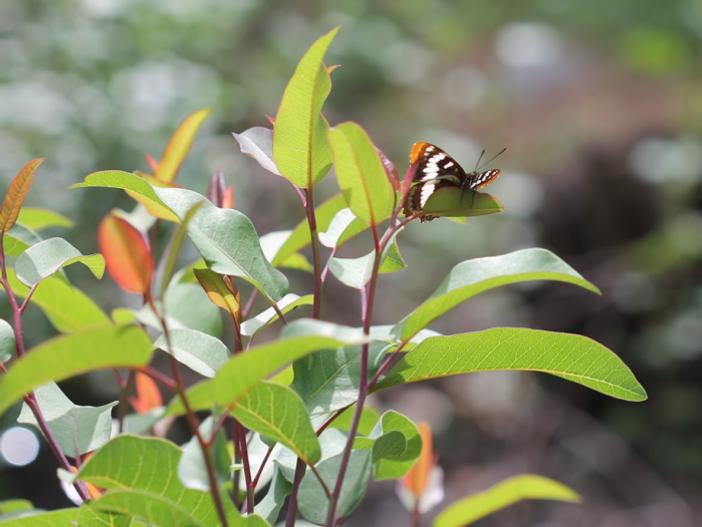Laurel Sumac
(Malosma laurina)
Laurel Sumac (Malosma laurina)
/
/

Photo by Easyscape
CC BY-SA 4.0
Image By:
Photo by Easyscape
Recorded By:
Copyright:
CC BY-SA 4.0
Copyright Notice:
http://creativecommons.org/licenses/by-sa/4.0/ | CC BY-SA 4.0


























































Estimated Native Range
Summary
Malosma laurina, commonly known as Laurel Sumac, is an evergreen shrub or small tree native to the chaparral and coastal sage scrub of California, Baja California, and the Channel Islands. It typically grows to a height of 3 to 5 meters (10–15 feet) with a rounded form. The leaves are leathery, glossy, and have a distinctive taco shell shape, contributing to the plant’s unique appearance. The foliage is aromatic, releasing a characteristic fragrance when crushed, attributed to volatile compounds within the leaves and stems. Laurel Sumac is particularly adapted to the chaparral’s fire-prone environment, with a burl that resprouts vigorously after fire events. It produces clusters of small, white flowers in the spring and winter, which are not particularly showy but do attract pollinators.
Laurel Sumac is valued for its drought tolerance and use in native plant landscaping, particularly in wildlife gardens and as a specimen in frost-free areas. It offers the ecological benefit of providing habitat and food for local fauna. In cultivation, it thrives in full sun and requires minimal water once established, making it suitable for xeriscaping. It is adaptable to a range of soil types, provided they have good drainage. Gardeners should be aware that Laurel Sumac can be sensitive to frost and may not be suitable for areas with cold winters. Additionally, its volatile oils can make it highly flammable, so it should not be planted in regions where wildfires are a concern.CC BY-SA 4.0
Laurel Sumac is valued for its drought tolerance and use in native plant landscaping, particularly in wildlife gardens and as a specimen in frost-free areas. It offers the ecological benefit of providing habitat and food for local fauna. In cultivation, it thrives in full sun and requires minimal water once established, making it suitable for xeriscaping. It is adaptable to a range of soil types, provided they have good drainage. Gardeners should be aware that Laurel Sumac can be sensitive to frost and may not be suitable for areas with cold winters. Additionally, its volatile oils can make it highly flammable, so it should not be planted in regions where wildfires are a concern.CC BY-SA 4.0
Plant Description
- Plant Type: Shrub
- Height: 9-16 feet
- Width: 9-16 feet
- Growth Rate: Rapid
- Flower Color: Cream, White
- Flowering Season: Spring, Winter
- Leaf Retention: Evergreen
Growth Requirements
- Sun: Full Sun
- Water: Low
- Drainage: Fast, Medium, Slow
Common Uses
Bird Garden, Butterfly Garden, Deer Resistant, Drought Tolerant, Erosion Control, Fire Resistant, Low Maintenance, Street Planting
Natural Habitat
Native to chaparral and coastal sage scrub of California, Baja California, and the Channel Islands
Other Names
Common Names: Lentisco
Scientific Names: Malosma laurina , Rhus laurina , Lithraea laurina , Toxicodendron laurinum
GBIF Accepted Name: Malosma laurina (Nutt. ex Torr. & A.Gray) Engl.